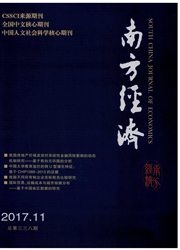

 中文摘要:
中文摘要:
在区域协调发展的背景下,政府之间点对点合作来共建产业转移园区是我国产业转移政策的重要形式,但现有的文献很少对这种政策的作用机制和效果进行分析。不同于以往文献从产业的视角,本文考虑到同一行业内企业之间的差异,在新近发展起来的异质性企业集聚理论的基础上,运用广东合作产业转移园的调查数据,通过直接观察政府政策如何影响企业迁移行为,来分析这种产业转移政策的效果。结果显示,这种产业转移政策对异质性的企业具有选择效应:即使在同一行业内,那些投资规模大或用地面积大的企业更容易受政策的影响;相对于部分迁移的企业,整体迁移的企业更容易受政策的影响;由于这种选择效应的存在,政策对珠三角地区大量中小企业的迁移影响有限。本文研究结果意味着,要达到政策的预期目标,在制定政策时必须充分考虑不同类型企业的迁移行为差异。
 英文摘要:
英文摘要:
In the context of coordinated regional development, Point to point transfer between the governments which cooperate to build industrial park is the main form of industrial transfer policy, but existing literature rarely care about the mechanism and the result of it. Unlike previous literatures which from the perspective of industry, this paper take a first step to study how government policies affect firms migration behavior and to analyze the effect of this industrial transfer policy. Taking into account there are so many dimensions different between firms within the same industry, this paper use the survey data of Guangdong Cooperation Industrial Transfer Park to analyze the industrial transfer policies on migration behavior of firms which have difference in scale and land using. The results show: the policy selected firms with large - scale investment and with land - intensive to enter the industrial transfer parks designated by the government; with respect to the partial relocation firms, complete relocation firms are more affected by migration policies; because of this selection effect exists, the policy have limited impact on migration of a large number of SMEs of Pearl River Delta. The results imply that there is a significant selection effect of the policy. In order to achieve the policy objectives, it must take into account the different policy responses of heterogeneity firms.
 同期刊论文项目
同期刊论文项目
 同项目期刊论文
同项目期刊论文
 期刊信息
期刊信息
